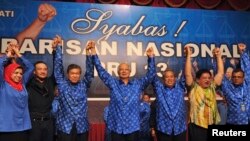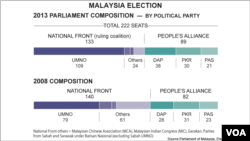KUALA LUMPUR —
After a tightly-fought national election Sunday, Malaysia’s ruling coalition Barisan National has won a mandate to continue its 56-year rule. But opposition leader Anwar Ibrahim has refused to accept the results, decrying the poll as fraudulent and rigged.
Counting extended into the early hours of Monday morning as Malaysians eagerly awaited the results of Sunday’s tight election.
The ruling coalition Barisan National, led by Prime Minister Najib Razak, won 133 out of 222 parliament seats, while the opposition garnered 89. It was the ruling coalition’s poorest electoral performance since independence from Britain in 1957.
Opposition leader Anwar Ibrahim has lashed out against the results.
Hours after voting closed, but before the ballots had been tallied, he announced on Twitter that the opposition had won. Under the hashtag ‘ubah’ meaning ‘change’ in Malay, Anwar urged the ruling party and the election commission not to hijack the results.
-222 parliamentary seats up for grabs
-More than 570 candidates
-13.2 million voters
-Barisan Nasional coalition has been in power since 1957
-Prime Minister Najib Razak leads the UMNO, the dominant party in the BN
-Anwar Ibrahim leads the three-party PR opposition alliance
After it became clear his fractious Pakatan Rakyat opposition had lost, Anwar said the integrity of the vote had been severely comprised.
“I don’t think it is fair to expect me to form a conclusion, or make a decision, based primarily on an election that we consider rather fraudulent. And, in fact the election commission has failed in its task," he said.
As the country hit the polling booths Sunday, allegations of electoral fraud were rife. The opposition claims the government flew in 40,000 foreigners from neighboring countries, granting them illegal identity cards so they could bolster the tally for the ruling party.
Stories of Bangladeshi workers bussed into polling booths have been heavily circulated on independent news websites and Twitter.
There was also criticism of the use of indelible ink, introduced this year to prevent double voting, but many voters claimed it was easily washed off.
Anwar has criticized the national electoral commission for failing to investigate, while Bersih, the Coalition for Clean and Fair Elections, is also collecting evidence of alleged fraud during vote counting and tabulation.
The election commission defended the electoral process, arguing that hundreds of observers, both domestic and international, had overseen the voting process.
Emphasizing his commitment to free and fair elections, Prime Minister Najib has vehemently denied the accusations.
Political analyst Keith Leong said the government has not shown an urgent willingness to investigate. He said, although alleged electoral fraud has long plagued Malaysian politics, ignoring it longer will ultimately erode the government’s legitimacy.
“The fact that people are talking about it now, it’s out in the open. Well maybe not in the mainstream media but online and amongst people they are talking about it so it is clearly a problem and if the government ignores it; I mean I can’t see how they afford to ignore this for too much longer,” he said.
Malaysia saw it highest ever voter turnout this year, with 80 percent, or some 10 million registered voters heading to the ballot box.
Despite the Barisan National win, independent media reported that Najib’s coalition won only 49 percent of the overall vote - the opposition securing 51 percent.
In what he called a ‘Chinese Tsunami’ Prime Minister Najib acknowledged that many ethnic Chinese sided with the opposition Sunday, and urged for national reconciliation to address what he described as an increasingly polarized Malaysian society - divided along racial lines.
Some analysts said Malaysia’s Chinese population is unhappy with government policies that unfairly benefit ethnic Malays.
But Leong said the divides are not confined to ethnicity. “It is also increasingly amongst social class and geographical demographics in the sense that both the urban and rural areas are pulling apart not only economically but toward social attitudes, political attitudes. And this is something that we will have to address sooner or later,” he said.
The popularity of Barisan National was hardest hit in the urban centers, while the opposition struggled to achieve broad appeal in rural areas.
The ruling coalition also failed to regain its two-thirds majority in parliament, a position Prime Minister Najib was under strong pressure to achieve
As the prime minister was sworn into office Monday afternoon, opposition leader Anwar Ibrahim vowed to pursue his claims.
Counting extended into the early hours of Monday morning as Malaysians eagerly awaited the results of Sunday’s tight election.
The ruling coalition Barisan National, led by Prime Minister Najib Razak, won 133 out of 222 parliament seats, while the opposition garnered 89. It was the ruling coalition’s poorest electoral performance since independence from Britain in 1957.
Opposition leader Anwar Ibrahim has lashed out against the results.
Hours after voting closed, but before the ballots had been tallied, he announced on Twitter that the opposition had won. Under the hashtag ‘ubah’ meaning ‘change’ in Malay, Anwar urged the ruling party and the election commission not to hijack the results.
Malaysian General Elections
Malaysian General Elections-222 parliamentary seats up for grabs
-More than 570 candidates
-13.2 million voters
-Barisan Nasional coalition has been in power since 1957
-Prime Minister Najib Razak leads the UMNO, the dominant party in the BN
-Anwar Ibrahim leads the three-party PR opposition alliance
“I don’t think it is fair to expect me to form a conclusion, or make a decision, based primarily on an election that we consider rather fraudulent. And, in fact the election commission has failed in its task," he said.
As the country hit the polling booths Sunday, allegations of electoral fraud were rife. The opposition claims the government flew in 40,000 foreigners from neighboring countries, granting them illegal identity cards so they could bolster the tally for the ruling party.
Stories of Bangladeshi workers bussed into polling booths have been heavily circulated on independent news websites and Twitter.
There was also criticism of the use of indelible ink, introduced this year to prevent double voting, but many voters claimed it was easily washed off.
Anwar has criticized the national electoral commission for failing to investigate, while Bersih, the Coalition for Clean and Fair Elections, is also collecting evidence of alleged fraud during vote counting and tabulation.
The election commission defended the electoral process, arguing that hundreds of observers, both domestic and international, had overseen the voting process.
Emphasizing his commitment to free and fair elections, Prime Minister Najib has vehemently denied the accusations.
Political analyst Keith Leong said the government has not shown an urgent willingness to investigate. He said, although alleged electoral fraud has long plagued Malaysian politics, ignoring it longer will ultimately erode the government’s legitimacy.
“The fact that people are talking about it now, it’s out in the open. Well maybe not in the mainstream media but online and amongst people they are talking about it so it is clearly a problem and if the government ignores it; I mean I can’t see how they afford to ignore this for too much longer,” he said.
Malaysia saw it highest ever voter turnout this year, with 80 percent, or some 10 million registered voters heading to the ballot box.
Despite the Barisan National win, independent media reported that Najib’s coalition won only 49 percent of the overall vote - the opposition securing 51 percent.
In what he called a ‘Chinese Tsunami’ Prime Minister Najib acknowledged that many ethnic Chinese sided with the opposition Sunday, and urged for national reconciliation to address what he described as an increasingly polarized Malaysian society - divided along racial lines.
Some analysts said Malaysia’s Chinese population is unhappy with government policies that unfairly benefit ethnic Malays.
But Leong said the divides are not confined to ethnicity. “It is also increasingly amongst social class and geographical demographics in the sense that both the urban and rural areas are pulling apart not only economically but toward social attitudes, political attitudes. And this is something that we will have to address sooner or later,” he said.
The popularity of Barisan National was hardest hit in the urban centers, while the opposition struggled to achieve broad appeal in rural areas.
The ruling coalition also failed to regain its two-thirds majority in parliament, a position Prime Minister Najib was under strong pressure to achieve
As the prime minister was sworn into office Monday afternoon, opposition leader Anwar Ibrahim vowed to pursue his claims.






